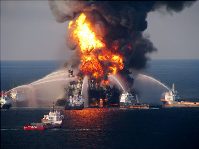Transocean pays $1.4bn to settle US Gulf oil spill
By TOM FOWLER
 Offshore driller Transocean will pay $1.4 billion to settle all federal civil and criminal issues relating to the 2010 Deepwater Horizon accident in the Gulf of Mexico, the US Department of Justice said Thursday afternoon.
Offshore driller Transocean will pay $1.4 billion to settle all federal civil and criminal issues relating to the 2010 Deepwater Horizon accident in the Gulf of Mexico, the US Department of Justice said Thursday afternoon.
Transocean was the owner of the Deepwater Horizon drilling rig that exploded in April 2010, killing 11 workers and triggering the largest offshore oil spill in US history.
It will plead guilty to one criminal misdemeanor violation of the Clean Water Act for failing to properly monitor the well at the time of the blowout and pay a $100 million fine, according to documents filed Thursday.
The company will also pay $1 billion in fines for civil violations of the Clean Water Act. Additionally, it will pay $150 million each to the National Fish and Wildlife Foundation and the National Academy of Sciences for oil spill response and habitat rehabilitation.
The Wall Street Journal reported the settlement earlier Thursday, citing people familiar with the matter.
"This is a positive step forward, but it is also a time to reflect on the 11 men who lost their lives aboard the Deepwater Horizon," Transocean said in a statement. "Their families continue to be in the thoughts and prayers of all of us at Transocean."
The Swiss offshore drilling contractor said previously in Securities and Exchange Commission filings that it had discussed a $1.5 billion payment with the Justice Department to resolve the civil and criminal claims. It has set aside a $2 billion noncash reserve for all Deepwater Horizon-related claims.
Analysts with Wells Fargo Securities called the settlement a likely surprise for Transocean investors who were worried the spill related liability could grow.
"We think the quantification of the liability should give ratings agencies more comfort in rating RIG's debt," Wells Fargo analysts said in a note to clients, referring to the company's stock abbreviation.
Oil giant BP, which had been leasing the Deepwater Horizon to drill an exploratory well in the Gulf of Mexico and was primarily in charge at the time of the accident, agreed to pay $4.5 billion in November to settle all criminal and some civil charges related to the accident.
The case against BP included 11 felony counts of "seaman's manslaughter" and a misdemeanor violation of the Clean Water Act.
BP must still contend with civil Clean Water Act violations, which could total more than $20 billion. If BP agrees to settle the civil violations the payments would likely be much less. But if it chooses to fight the claims in court, it could face fines of $4,300 for each of the estimated 4.9 million bbl of oil spilled if the company is found to have been grossly negligent.
Tom Claps, an analyst with Susquehanna Financial Group, said Transocean's settlement could be seen as a positive for BP since it does not include language that Transocean was grossly negligent in connection with the spill.
"The Justice Department said repeatedly in filings that both Transocean and BP were "grossly negligent" in their conduct," Mr. Claps said. He added that if the DOJ concluded Transocean was merely negligent, "it would improve the chances that BP would also just be called negligent and could mean their Clean Water Act fines would be much smaller than many have predicted."
Dow Jones Newswires






Comments